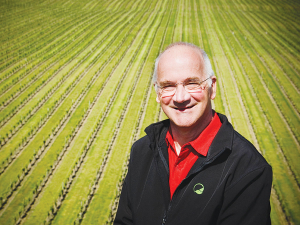His name has become synonymous with wine science. From a researcher, to a lecturer at Lincoln University, to a viticulturist for Villa Maria, back to a wine scientist based in Marlborough. Just about every wine industry accolade has been behooved upon him, he has been an integral part of the science behind New Zealand wine and now after 40 years, he has retired. I for one don’t know what I will do without Mike at the end of a phone to explain the ins and outs of the wine industry today. But rather than attempt to profile this great man, I thought it was better that he sum up his life of wine science.
The following is from his retirement speech, at the end of January.
Marion and I arrived in New Zealand in 1978, newly married and with a PhD certificate, on which the ink was hardly dry. It described that I knew how wheat seedlings responded to waterlogging damage.
I vividly remember my first bottle of New Zealand wine. We pulled the cork and it was totally undrinkable. Needless to say, my destiny was determined and the journey has been fun.
Science is fun. Having the opportunity to play and be paid for it, to ask and answer questions, then watch the results of your efforts used in the field and to think you have made a difference is immensely satisfying. Add to that encouraging and mentoring some of the brightest, most enthusiastic young people and watch them grow and in turn make a different is satisfying beyond description.
It has been a long journey, since we established the Marlborough Research Centre in the 1980’s. It was, and is unique in the New Zealand science scene and in the early years we managed to work our way through the minefield of satisfying many bosses in MAF, DSIR and the local politicians.
More recently, and I am talking the past 30 years, it was Lincoln. I have just spent three days at the Sauvignon Celebrations and had the pleasure of catching up with other students I taught at Lincoln when I was there.
My three years with Villa (Maria) let me put theory into practice. To work alongside people like Sir George gave me an understanding of what is really important in the vineyard. And to the growers. In particular a realisation that the grower’s livelihood, vineyard and house depend on the decisions they make and in some cases the information we as scientists provide.
Most of my career has been in science in Marlborough. I have always tried to direct my research to provide a useful outcome to industry. However, I firmly believe that a strong background in plant physiology is necessary if we are to understand the processes behind vine development. Viticulture is full of dogma, which if we accept without challenge, will prevent future innovation.
My research in Marlborough and while at Lincoln covered a wide range of topics. I divide scientists into two groups; those that know more and more about less and less until they know everything about nothing. And those that know less and less about more and more until they know nothing about everything. I consider myself in the latter group, having undertaken work ranging from bird behavior in vineyards to irrigation and canopy management. As I look across my research output, there are many highlights.
Irrigation and in particular how vine under storey may be used to manage vine vigour. When I started the research, vineyards were largely cultivated and there were questions about the need to irrigate. There are few cultivated vineyards today. One of the unexpected outcomes of our research was the benefit that the under storey has on the breakdown of vine prunings and the consequent benefit in Botrytis management and vineyard efficiency.
The frost review that Stan Howell (from Michigan State University) and I prepared in 1999. This was widely used after the frosts a few years later and still gets referred to.
The influence of Sauvignon Blanc vine management on key flavour and aroma compounds in our iconic wine. While we have made a lot of progress, there is still more to do.
Lower alcohol wines. Our initial research looking at desynchronizing sugar accumulation from other metabolites was done by a couple of my PhD students. The understanding they provided on how leaf area; fruit weight ratio changes the synchrony of fruit development was integrated into a low alcohol wine programme I undertook with John Forrest.
More recently, this understanding has been used in trying to predict the possible consequences of climate change, in particular how warming may change vine phenology and composition.
The work we did on vine shaking. Initially undertaken to manage yields, it is now widely used to manage botrytis.
Possibly the biggest step jump in Botrytis management in 10 years.
Yield prediction. My phone runs hot in June as viticulturists ask for my prediction in the coming season.
After 2008 I seemed to spend hours on the road talking to growers about the processes and physiology of grapevine yield development.
Science is about trying to anticipate the future. Today’s problems have to be solved with today’s information. Tomorrow’s problems have to be worked on today.
The New Zealand wine industry holds a special place in the world, which we are all passionate about. Our industry is like a grapevine, it needs to nurtured and cared for to grow and remain healthy, for all great wines start in the vineyard.
Dr Mike Trought also paid tribute to the many people he had worked with over his 40 years in the industry including; Damian Martin, Bala, Craig Jensen, Andrew Naylor, Richard Hunter, Jeff Bennett, Amber Parker and Mark Greven to name just a few. Plus his wife Marion.












